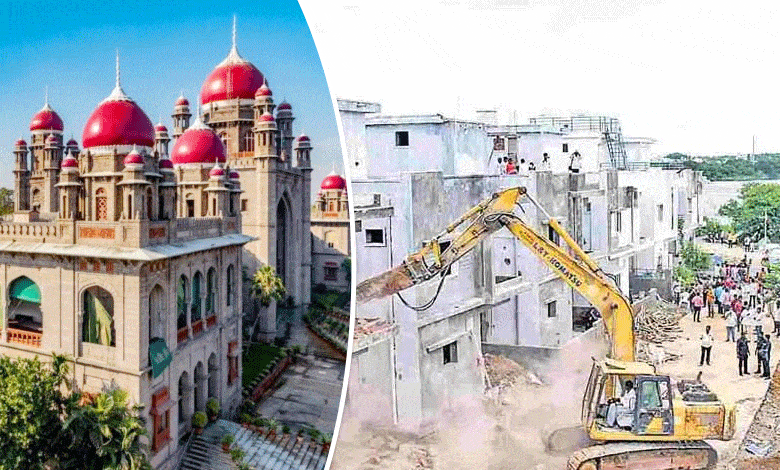Telangana HC Orders Relief Measures for Residents Affected by Musi Development
The court instructed the Revenue Department to conduct a detailed socio-economic survey of affected residents, ensuring their relocation to suitable accommodations under existing government policies. Justice Bhaskar Reddy emphasized the importance of balancing urban development with the welfare of displaced residents.

Hyderabad: The Telangana High Court, presided over by Justice CV Bhaskar Reddy, issued key directives to the state government concerning the removal of unauthorized constructions along the Musi River. The directives followed nearly 45 writ petitions filed by residents whose properties fall within the Full Tank Level (FTL) and buffer zones, areas affected by the Musi Riverfront Development Project.
Table of Contents
Also Read: Hyderabad’s Old City Metro Rail Construction to Start in January 2025
Court Orders Socio-Economic Survey
The court instructed the Revenue Department to conduct a detailed socio-economic survey of affected residents, ensuring their relocation to suitable accommodations under existing government policies. Justice Bhaskar Reddy emphasized the importance of balancing urban development with the welfare of displaced residents.
The authorities were directed to:
- Evict illegal encroachments from the FTL, River Bed Zone, and Buffer Zone promptly.
- Prevent sewage discharge into the Musi River.
- Follow legal procedures during evictions and relocations.
Residents’ Grievances
Petitioners argued that their properties were built in layouts approved by the Hyderabad Metropolitan Development Authority (HMDA) and complied with Greater Hyderabad Municipal Corporation (GHMC) regulations. They accused the Hyderabad Disaster Response and Asset Protection Agency (HYDRAA) of overreach, alleging that their properties were being demolished without proper legal notice or investigation.
Residents also highlighted that many of them had valid permits and had paid all relevant taxes. They questioned the government’s selective approach to enforcement while ignoring issues like sewage contamination and illegal dumping.
Government’s Defense
The state officials justified the demolition drive, claiming it was necessary for the larger goal of rejuvenating the Musi River. They revealed that an earlier survey identified over 10,000 illegal structures in the riverbed and buffer zones.
- Rehabilitation Progress:
- 319 families have been relocated to 2BHK housing provided by the government.
- Financial aid has been extended to assist affected families in rebuilding their lives.
Officials also stressed that the project aims to improve water quality, enhance urban green spaces, and restore the ecological balance of the river.
Court’s Comprehensive Directions
Justice Bhaskar Reddy laid out specific guidelines for the authorities:
- All temporary and unauthorized structures within protected zones must be removed lawfully and within a set timeframe.
- Structures violating the 2012 Building Rules should be demolished.
- Local trial courts were instructed to avoid issuing injunctions that could stall the project.
- Police were directed to provide security for officials carrying out surveys and evictions.
Additionally, the court warned of criminal action against individuals involved in illegal land grabbing or environmental damage, citing the Telangana Irrigation Act and the WALTA Act, 2002.
Balancing Development and Rehabilitation
The court underscored the importance of adhering to due process while ensuring the displaced communities are adequately rehabilitated. It called for transparency in the survey and relocation processes, urging authorities to prioritize public interest without neglecting individual rights.
With the High Court’s firm directives, the state government is now tasked with accelerating the Musi Riverfront Development Project while addressing the socio-economic concerns of affected residents.
